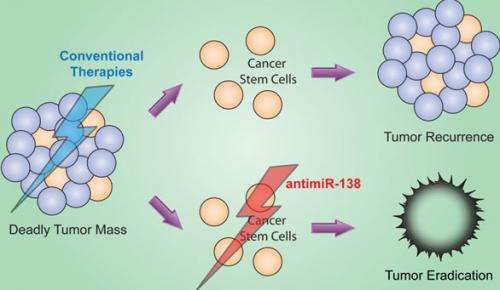Current therapies eradicate tumour cells initially but cancer stem cells may allow for tumours to recur. AntimiR-138 can destroy cancer stem cells and hence tumour growth.
(Medical Xpress)—A*STAR scientists have identified a biomarker of the most lethal form of brain tumours in adults − glioblastoma multiforme. The scientists found that by targeting this biomarker and depleting it with a potential drug, they were able to prevent the progression and relapse of the brain tumour. The research findings were published on Aug 23 in the scientific journal, Cell Reports from Cell Press.
The scientists found that the biomarker, miR-138, is highly expressed in cancer stem cells compared to normal neural stem cells. They thus carried out in vitro experiments to deplete miR-138 in these cancer stem cells with a potential drug, antimiR-138, to observe the effect. They found that when miR-138 is depleted, the cancer cells are completely destroyed. This is an important breakthrough as current therapies such as gamma radiation and surgical methods proved to be inadequate in treating these brain tumours, which tend to re-grow from cancer stem cells and become extremely lethal.
Dr Sampath said, "In this study we have identified a master regulator, miR-138, which is essential for the progression and relapse of a deadly form of brain cancer. By targeting this regulator we can effectively prevent the recurrence of this lethal form of cancer. This promising finding will pave the way for the development of a novel therapy to successfully treat the aggressive forms of brain cancer."
Studies were also done in mice to determine whether antimiR-138 could effectively inhibit the growth of tumours. These experiments were conducted with a control drug as well, revealing that tumours continued to be present when mice were injected with the control, while injection with the antimiR-138 showed no tumour growth after nine months.
Dr Alan Colman, Executive Director of Singapore Stem Cell Consortium and a Principal Investigator at IMB said, "Malignant gliomas are a particularly devastating and lethal form of human brain cancer. As with a growing number of other cancers, evidence is accumulating that the persistence and chemo-resistance of this cancer is due to the presence of glioma stem cells (GSCs). In this exciting publication, Sampath and colleagues indicate that in the tumours, these GSCs express the microRNA-138 (miR-138) and that the targeted elimination of this RNA markedly reduced the growth and survival of GSCs in cell culture. This work highlights the possible significance of miR-138 as a prognostic biomarker and also suggests miR-138 synthesis as a target for therapeutic intervention."
Prof Sir David Lane, Chief Scientist at A*STAR, added, "These findings will facilitate the translation of basic research into clinical applications such as targeted drug design to treat brain cancer."
More information: Xin Hui Derryn Chan et al., "Targeting Glioma Stem Cells by Functional Inhibition of a Prosurvival OncomiR-138 in Malignant Gliomas". Cell Press. August 23.
Journal information: Cell Reports



















